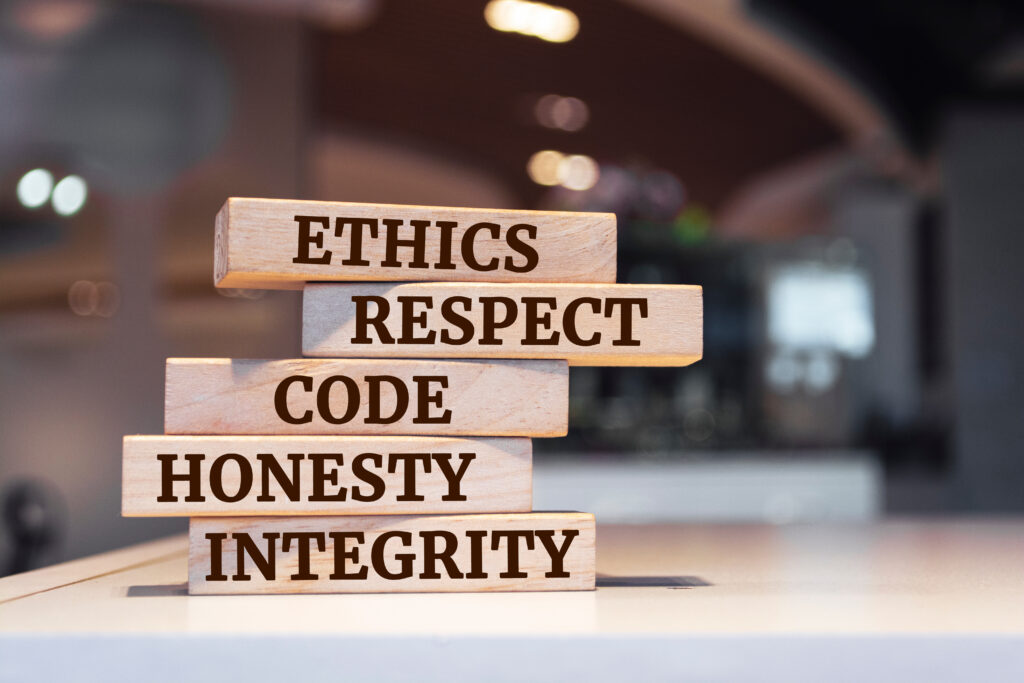“Set your expectations high; find men and women whose integrity and values you respect; get their agreement on a course of action; and give them your ultimate trust.” – John F. Akers, IBM CEO
Business values have a profound influence on organizational culture. Values shape how individuals interact, decisions are made, and an organization’s operations are impacted. By having a solid understanding of corporate core values, business owners can develop them to create a strong sense of identity that drives social behavior in the workplace and encourages employees to be more productive while maintaining morale. This blog discusses the importance of a company’s core values and how they impact employee behavior and organizational culture.
What are Business Values?
Company or corporate values are the principles and beliefs that serve three organizational functions:
-
- Values define how an organization conducts itself as it works toward achieving its mission and objectives.
- Values help establish the unique social and behavioral norms that shape an organization’s culture.
- Values guide the decisions of company leaders insofar as how they manage relationships with customers, employees, vendors, and other stakeholders.
What is a company values statement?
“Sometimes it is better to lose and do the right thing than to win and do the wrong thing.” – Tony Blair.
A values statement lists the company’s core principles that guide and direct the organization and shape its culture. Values statements help to communicate a business’s moral compass to managers and employees. Further, business values help managers make decisions and create standards whereby those decisions or actions can be measured against.
For instance, if a company adopts “eco-friendly” as a key value and defines it as “operating in a way that is not harmful to the environment.” This principle anchors the decisions and actions of employees and managers in the workplace for product offerings, procedures, and other operational constituents. In addition, the statement communicates to consumers that the company deems the natural environment a critical priority.
Examples of Business Values
“Culture is simply a shared way of doing something with a passion.” – Brian Chesky, Co-Founder, CEO, Airbnb
Corporate values represent the business culture’s guiding principles, including what guides members’ priorities and actions within the organization. Values are an increasingly important component in strategic planning because they drive the intent and direction of the organization’s leadership. Below are examples of values organizations use to describe their core values:
- Business Integrity: Integrity is acting with honor regardless of whether your actions are public; or committing to doing what you say you will do. It’s about having an ethical culture that is embraced by your entire organization.
- Accountability: Accountability is an assurance that an individual or organization is assessed on its performance or behavior related to its corporate responsibilities. The term is related to responsibility but is regarded more from the perspective of oversight.
- Business Excellence: Excellence is about developing and strengthening managerial systems and organizational processes to improve outcomes and create stakeholders value
- Collaboration: Collaboration in the business allows people to work together to achieve a defined, common business purpose. Collaboration can occur in real-time through tools like online meetings and instant messaging or over a drawn-out period through shared workspaces in the cloud.
- Innovation: innovation is an organization’s process for introducing new ideas, workflows, methodologies, services, or products.
- Eco-Friendly: Eco-friendly businesses operate sustainably, causing minimal environmental damage and using renewable resources where feasible. For instance, it considers where its supplies come from and how they are made. An eco-friendly committed company will work with environmentally ethical suppliers and source materials locally to reduce its carbon footprint.
- Diversity: Diversity in the workplace refers to an organization that intentionally employs a workforce of individuals with various characteristics, such as gender, religion, race, age, ethnicity, sexual orientation, education, and other attributes.
- Learning Organization: A learning organization is adept at creating, acquiring, and transferring knowledge between individuals and modifying its behavior to reflect gained knowledge and insights. This definition begins with a simple truth: new ideas are essential if learning is to take place.
- Organizational Fairness: Organizational justice is an employee’s perception of fairness in the workplace. It’s whether people believe their organization’s processes, decisions, and norms are fair and equitable.
- Business Honesty: Honesty is the quality of being truthful and trustworthy. Honesty means to tell the truth at all times, even at personal risk to one’s stature. Honesty in business is also known as ethical behavior. Truthfulness means making true statements about people, events, and things.
- Business Loyalty: Loyalty is the byproduct of a customer’s positive experience with you and works to create trust. Loyal customers. Purchase repeatedly. Use what they purchase. Interact with you through a variety of different channels.
- Customer-Centric: Customer-centricity demands that the consumer is the focus of all decisions related to the delivery of goods, services, and customer experiences. The aim is to create customer satisfaction, loyalty, and advocacy.
Examples of Values Statements From Successful Retailers
Company values are the most essential component of organizational culture. Values reinforce employees’ understanding of the business’s purpose and their role in achieving it. Well-articulated values are consistent with leadership actions, decisions, and behaviors and are intertwined into the organization’s fabric to provide the foundation for culture.
“We try to have the kind of a culture that doesn’t value excuses in the sense that when you’re supposed to accomplish something, and you’re at a high level, then your job is to accomplish it, in spite of difficulty. And you’re rewarded for dealing with that.” – Phil Libin
The following are values statements from successful retail businesses:
McDonald’s Value Statement
We serve delicious food people feel good about eating, with convenient locations and hours and affordable prices, and by working hard to offer the speed, choice, and personalization our customers expect.
Dunkin Donuts Value Statement
Dunkin’s core values comprise “honesty, transparency, humility, and integrity.” With these principles, the company has set a practice that customers appreciate and feel part of.
Circle K Value Statements
Circle K acts with honesty & integrity. We are inclusive; we treat each other, our customers, and our suppliers with respect. We strive towards a cleaner, safer, equitable workplace and planet.
Barnes & Noble Value Statement
Barnes & Noble’s core values include “customer service, quality, empathy, respect, integrity, responsibility, and teamwork.” To emerge as a top player in the bookselling industry, and thrived since 1886, this company needed to run on specific principles.
Lowe’s Value Statement
Lowe’s maintains high ethical standards, acting with honesty and integrity in day-to-day interactions with customers, fellow employees, vendors, shareholders, and the communities where it operates. Lowe’s has zero tolerance for unethical or dishonest behavior.
3M Value Statement
3M core values include “collaboration, innovation, perseverance, passion for change, integrity, and honesty.” The current status of 3M is the result of a mature internal culture. This has been made possible due to the core values enforced by the company since its early days. Together, these values have enabled 3M to emerge as one of the biggest and most reputable global corporations.
Tesla’s Values Statement
Tesla’s core values comprise “doing the best, taking risks, respect, constant learning, and environmental consciousness.” Tesla applies these values as the principles that govern the overall attitudes and practices of all stakeholders and its workforce.
Assessing Company Values
The efficacy of a company’s values can be measured through employee morale, engagement, productivity, voluntary turnover, and customer loyalty. When a company has strong values and a positive culture with a communicated purpose and goals that uphold its mission and values, the return can be seen in the bottom line.
How to write a compelling values statement?
A Company values statement should be memorable, actionable, and timeless. The format of the values statement depends on the organization and its purpose. Most organizations express their core values in one to three phrases. When writing your company values statement, remember the following guidelines:
-
- Make a list of values that describe how you intend to operate.
- Choose the 2-3 values that most accurately support your business goals.
- Keep it concise, looking out for and removing wordiness.
- Focus on clarity, use simple language, and avoid jargon.
- Use bullet points to make your statement easy to skim and read.
- Develop metrics to assess your company values.
- Review and revise regularly as required.
“Your beliefs become your thoughts. Your thoughts become your words. Your words become your actions. Your actions become your habits. Your habits become your values. Your values become your destiny.” – Mahatma Gandhi.
A company’s core values are more than just a list of beliefs; they can shape an organization’s culture and define how employees interact with each other and its customers. Taking the time to understand a business’s values and develop them in a way that supports its goals, can create a positive work environment that encourages productivity and drives success. But do you know what your company’s core values are? Do they align with the way you operate as an organization? If not, it might be time for a Values Assessment exercise to get everyone on the same page.
Thank you for reading our article!
TimeWellScheduled is a secure online time and attendance software that is 100% tailored to meet your scheduling needs! In addition, TimeWellScheduled facilitates employee attendance tracking & payroll tasks and enhances staff management capabilities. Plus, our service is free for up to 10 employees!
Click: here to download our (Excel) employee scheduling template; IT’S FREE!






